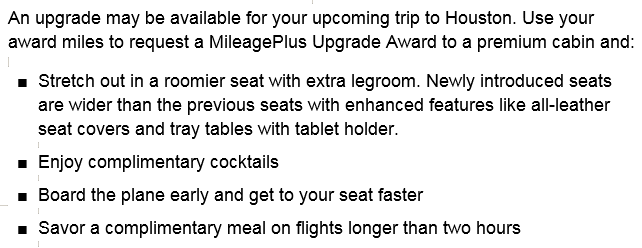News and notes from around the interweb:
- I literally need to be at the Houston Bush Intercontinental airport soon, or else I wouldn’t be flying from Austin to Houston. United has the non-stop flight, so bought a ticket on United. I didn’t pay the $59 they wanted to upgrade to first on a regional jet.
While I declined that buy up, two days after purchase United sent me an email suggesting I use miles to upgrade instead.

Since I wouldn’t spend $59, do you think I’d take them up on this?

- Starting June 13, T-Mobile customers will get an hour of gogo inflight internet on every flight free.
- Cathay Pacific has launched a year-long collaboration with Hyatt chefs for their long haul flights departing Hong Kong in all classes of service.

The trick of course is always in the level of investment and in the execution.
- Per Airline Weekly, “Of all the miles [MileagePlus] customers redeemed last year, 83% were for United flights and upgrades”
- Marriott CEO Arne Sorenson wants regulation to smother small competitors.
“I personally think (Airbnb) is moving from a first phase, which is classic shared economy, where hosts find a way to monetize an extra room in their house or their house when they’re gone,” said Sorenson. “Phase two, which is underway now, is really in many ways like a micro-hotel thing, where small business people are saying I’m going to take a gamble and see if I can make enough spread between the cost to acquire those units and what I can get from customers.”
In that case, Sorenson asserted, those commercial operators need to be regulated just like hotels.
“I think when you’re in that place, it’s crystal clear that the rules be fair,” he continued. “So if you’re running a micro-hotel, you oughta make sure you’re paying your lodging taxes, you got to make sure you’ve got permits that permit you to do the business, and you’ve got to make sure the product quality is such that it meets the safety standards that apply.”
A company like Marriott has the infrastructure to manage regulatory complaince, and spread fixed costs across thousands of hotel properties. So it will always favor regulations, which serve as barriers to entry for small competitors.
- Meanwhile even though the Marriott acquisition of Starwood won’t mean a combined loyalty program before 2018, that doesn’t mean we won’t see changes you’re gonna like before then.
[Marriott CEO Arne] Sorenson: What we’ve said so far is we don’t think we’ll have one program before 2018, but that doesn’t mean we’ll take interim steps between now and until then. Stay tuned for that.


Gary –
On the “snothering” competition – I hope you’re being a little hyperbolic for dramatic effect.
I have an elderly family member who lives in Napa. Not the touristy parts, but in a middle class neighborhood in the city of Napa.
The law in Napa is very clear, there are only a few dozen permits available for people who want to rent their entire home out for short term “vacation” rentals.
My family member’s neighbor (who lives out of state) is blatantly violating the law by regularly renting out the house for weekends, sometimes to 8 or 10 people.
This stuff has a dramatic effect on people’s lives.
To be clear, I’m a fan of the sharing economy, and believe in disrupting markets (e.g. Uber, Lyft, etc.), but this is different. This is disruption of people who are not part of the market.
@gary: Same thing for me. Bought a own coach ticket MEX-TPA for $177-. Same ticket in business was $597-.
On check-in was offered opportunity to upgrade. MEX-IAH leg was $218- and IAH-TPA was $599- for a total of $817- (really a total of $994- including cost of original ticket).
Someone in the IT department at UA needs to tweak the software, methinks.
@greg99 My point is that Marriott’s interest here – whatever you think of laws, etc. – is not purely civic. You can think that Airbnb is bad, that existing laws or new laws ought to be enforced, but don’t mood affiliate with Marriott when they voice something you agree with. Understand why it makes sense for them (or any hotel company) to take the position they do.
In fairness to Sorenson, I’m seeing the same thing on airbnb: you’ve got entrepreneurs fixing up multiple properties in a city or town to rent them on airbnb. While I’m no fan of excessive gov’t regulation, it does seem like such properties should be regulated the same as other multi-unit short term rentals.
That said, I think airbnb poses very little risk to Marriott’s business model, at least in the USA. The idea that Americans are suddenly going to flock to small time overnight lodging accommodations — much less extra bedrooms in people’s homes — seems like pure fantasy. There’s frankly too much drama in such rentals. The bigger risk, I think, is to so-called resort hotels where you can now easily get the information to rent alternatives condos/houses in such locations that often provide more amenities at lower prices than the resort hotels. For example, in a place like Hawaii, it seems foolish to pay big bucks for a hotel room when there are much better and cheaper alternative accommodations available for your vacation.
@greg99, nothing you said shows that there has been a dramatic effect or disruption to anyone’s life. I don’t see how having 8-10 people who have rented the house for the weekend is any different from having 8-10 people who live there full time. If the people who are there have disrupted your relative’s life in some way, they should call the cops, just like they would with any other neighbor.
This is coming from someone who manages these homes for a living and has hotel licenses for all of them and pays the appropriate taxes for them. It pisses me off that others do not get the licenses or pay the taxes, but it has nothing to do with disrupting anybody’s life, it is simply a matter of fairness.
Sorenson is right. Airbnb is fine to rent out one room, but to start opening properties for always temporary stays (days), then you are now running a hotel. Hotels are regulated and pay taxes as he said. What I would be curious to know, is how is liability affected with these “micro-hotels”? Let’s say you’re at a Marriott property, something happens at that property, a fire, a water leak, etc. and you incur damages. The hotel owners are liable and have insurance to cover those types of things. Some fly by night property owner may not be in a position to cover events like a hot water heater exploding, or a deck collapse. You would always be able to sue for damages but I would rather go after a large corporation if it came to that than “some guy” I rented a room from at some random house.
FYI, I’ve been thinking about a TMobile switch from ATT for the last little while, yesterday’s free hour of Gogo pushed me to look into it. Everything was looking good, and a bit cheaper/month than I am currently. Then I asked about WiFi calling using my new Moto (unlocked) phone. Nope, gotta be a TMobile phone to use it. So there’s now no point for me to change, coverage is very spotty where we live but ATT is very robust.
How much is mileage upgrade on AA for DFW-AUS? Oh wait, it’s also 15,000 miles + $75. I guess you should write about American’s VERY BAD UPGRADE DEAL in the near future. Or not.
Does AA.com offer an option for upgrade using mileage?
@ptahcha the point here was United proactively pushing me to do this. American’s pricing for a similar segment would be the same.
United airlines upgrade deal..how do you know if it’s good? Example for me is a bought the $443 IAD to CDG economy class ticket special. I checked for an upgrade to business and they offered an upgrade each way a 20k miles + $500. A normal business class is a lot more than the $443+ $500+20k miles for even one way or obviously double the cash and mi,Es for round trip. Thoughts and does UAL do this type of cash and points upgrades only?